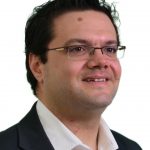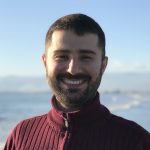VISITORS & AFFILIATED SCIENTISTS
Tom Baran – Research Affiliate and Visiting Lecturer

Dr. Baran is currently a Research Affiliate in the RLE Digital Signal Processing Group, and a Visiting Lecturer in the Department of Electrical Engineering and Computer Science at the Massachusetts Institute of Technology. He is also an MITx fellow. He received the S.B. degree (summa cum laude) in electrical engineering and in biomedical engineering from Tufts University in 2004 and the M.S. degree in electrical engineering from MIT in 2007. He performed his Ph.D. thesis research at MIT with Prof. Oppenheim, receiving the Ph.D. degree in 2012. Dr. Baran has significant experience in both teaching and research in signal processing. His research interests lie in the general field of signal processing theory and in signal-flow architectures for distributed signal processing, and his interests often tend toward acoustic applications. He is also author of Autotalent, a widely used open-source library for musical pitch correction.
Dr. Baran was awarded the MIT School of Engineering Graduate Student Extraordinary Teaching and Mentoring Award in 2011, and in 2010 was awarded the MIT EECS Carlton E. Tucker Award for Teaching Excellence. He also received Best Student Paper at the 2011 IEEE DSP Workshop and in 2006 was awarded the MIT EECS Morris J. Levin Award for Outstanding Oral Thesis Presentation. Dr. Baran is a member of IEEE, Eta Kappa Nu, Tau Beta Pi and Sigma Xi.
Petros Boufounos – Affiliated Scientist

Petros T. Boufounos is a Distinguished Research Scientist and the Computational Sensing Senior Team Leader at Mitsubishi Electric Research Laboratories (MERL). Dr. Boufounos completed his undergraduate and graduate studies at MIT. He received the S.B. degree in Economics in 2000, the S.B. and M.Eng. degrees in Electrical Engineering and Computer Science (EECS) in 2002, and the Sc.D. degree in EECS in 2006. Between September 2006 and December 2008, he was a postdoctoral associate with the Digital Signal Processing Group at Rice University. Dr. Boufounos joined MERL in January 2009, where he has been heading the Computational Sensing Team since 2016.
Dr. Boufounos’ immediate research focus includes signal acquisition and processing, computational sensing, inverse problems, quantization, and data representations. He is also interested in how signal acquisition interacts with other fields that use sensing extensively, such as machine learning, robotics, and dynamical system theory. He has over 40 patents granted and more than 10 pending, and more that 100 peer reviewed journal and conference publications in these topics. Dr. Boufounos has served as an Area Editor and a Senior Area Editor for the IEEE Signal Processing Letters, and as a member of the SigPort editorial board and the IEEE Signal Processing Society Theory and Methods technical committee. He is currently an Associate Editor at IEEE Transactions on Computational Imaging and the general co-chair of the ICASSP 2023 organizing committee. Dr. Boufounos is an IEEE Fellow, and was named IEEE SPS Distinguished Lecturer for 2019-2020.
Sefa Demirtas – Affiliated Scientist

sefademirtas@gmail.com
Sefa Demirtas received the B.Sc. degree in electrical and electronics engineering (summa cum laude) from Bogazici University in Istanbul, Turkey, in 2007 and the M.Sc. and Ph.D. degrees in electrical engineering and computer science from the Massachusetts Institute of Technology (MIT), Cambridge, MA, in 2009 and 2014, respectively. While at MIT, he was a Research Assistant with the Digital Signal Processing Group (DSPG) and he held several Teaching Assistant positions in the EECS department mainly in graduate and undergraduate level signal processing classes.
Dr. Demirtas is currently a Senior Manager of Research at Analog Devices, Boston MA. His current research interests lie broadly in signal processing, statistical inference, and machine learning.
Dan E. Dudgeon – Affiliated Scientist

Dr. Dan E. Dudgeon has been active in the fields of image processing, array signal processing, multidimensional signal processing, and target recognition for over forty years. He is currently retired. From 2002 to 2011, he was a senior principal systems engineer with BAE Systems’ Signal Processing Technology department, working on developing signal processing techniques for distributed sensing and distributed communications applications. From 1979 through 2002, he participated in and supervised various research programs in multidimensional signal processing and machine vision at the MIT Lincoln Laboratory, including work on an experimental target recognition system for
laser radar imagery and model-based target recognition algorithms for synthetic aperture radar data. From 1974 through 1978, he worked at Bolt, Beranek, and Newman, Inc., Cambridge MA, developing algorithms for processing underwater acoustic signals and tracking acoustic targets.
In addition to numerous papers on multidimensional signal processing and automatic target recognition, he co-authored “Two-Dimensional Digital Filtering” in the Proceedings of the IEEE, which was awarded the 1976 IEEE Browder J. Thompson Memorial Prize. He also co-authored the texts “Multidimensional Digital Signal Processing”, published by Prentice-Hall in 1984, and “Array Signal Processing: Concepts and Methods”, published by Prentice-Hall in 1993.
Because of his contributions to the field of multidimensional signal processing, Dr. Dudgeon was named a Fellow of the IEEE in 1987. In 1988 he was named a Distinguished Lecturer of the IEEE Acoustics, Speech, and Signal Processing Society. He was a charter member of the IEEE Signal Processing Society’s Technical Committee on Multidimensional Signal Processing, and during 1986-7 he served as its chairman. He also served as Secretary of the IEEE Signal Processing Society from 1988-91 and on its Board of Governors from 1995-96.
Dr. Dudgeon was educated at the Massachusetts Institute of Technology, receiving both Bachelor’s and Master’s degrees in Electrical Science and Engineering in 1970. As a graduate student he was affiliated with the Digital Signal Processing Group of the MIT Research Laboratory of Electronics as well as the MIT Lincoln Laboratory, receiving the Doctor of Science degree specializing in Signal Processing in 1974.
Yonina Eldar – Visiting Professor

Yonina Eldar is a Professor in the Department of Mathematics and Computer Science at the Weizmann Institute of Science, Rechovot, Israel. She is also a Visiting Professor at MIT and at the Broad Institute and an Adjunct Professor at Duke University, and was a Visiting Professor at Stanford University. She received the B.Sc. degree in physics and the B.Sc. degree in electrical engineering both from Tel-Aviv University (TAU), Tel-Aviv, Israel, in 1995 and 1996, respectively, and the Ph.D. degree in electrical engineering and computer science from MIT in 2002. She performed her PhD in DSPG under the supervision of Prof. Al Oppenheim. She is a member of the Israel Academy of Sciences and Humanities, an IEEE Fellow and a EURASIP Fellow.
She has received many awards for excellence in research and teaching, including the IEEE Signal Processing Society Technical Achievement Award (2013), the IEEE/AESS Fred Nathanson Memorial Radar Award (2014) and the IEEE Kiyo Tomiyasu Award (2016). She was a Horev Fellow of the Leaders in Science and Technology program at the Technion and an Alon Fellow. She received the Michael Bruno Memorial Award from the Rothschild Foundation, the Weizmann Prize for Exact Sciences, the Wolf Foundation Krill Prize for Excellence in Scientific Research, the Henry Taub Prize for Excellence in Research (twice), the Hershel Rich Innovation Award (three times), the Award for Women with Distinguished Contributions, the Andre and Bella Meyer Lectureship, the Career Development Chair at the Technion, the Muriel & David Jacknow Award for Excellence in Teaching, and the Technion’s Award for Excellence in Teaching (two times). She received several best paper awards and best demo awards together with her research students and colleagues, was selected as one of the 50 most influential women in Israel, and was a member of the Israel Committee for Higher Education. She is the Editor in Chief of Foundations and Trends in Signal Processing and a member of several IEEE Technical Committees and Award Committees.
James Ward – EECS Lincoln Lecturer

Dr. James Ward is Associate Head of the Communication Systems Division at MIT Lincoln Laboratory. He helps direct a portfolio of programs spanning technology development, architecture definition, analysis and prototyping to advance the nation’s communications capabilities. This portfolio includes research efforts in protected communications, robust tactical networks, laser communications, communications signal processing, and multifunction spectrum operations. Dr Ward also holds a Lincoln Lecturer position with the MIT EECS Department where since 2014 he has been teaching graduate courses in signal processing and radar.
Dr. Ward is an author of over 30 papers and a widely referenced technical report on space-time adaptive processing. He is a Fellow of the IEEE and a recipient of the MIT Lincoln Laboratory Technical Excellence Award. In 2003, he received the IEEE Aerospace and Electronic Systems Society Fred Nathanson Young Radar Engineer Award for contributions to adaptive radar and sonar signal processing. He is a past member of the National Academy Naval Studies Board and has served the Air Force Scientific Advisory Board. Dr. Ward holds a BSc degree from the University of Dayton, and MSc and PhD degrees in electrical engineering from The Ohio State University.
